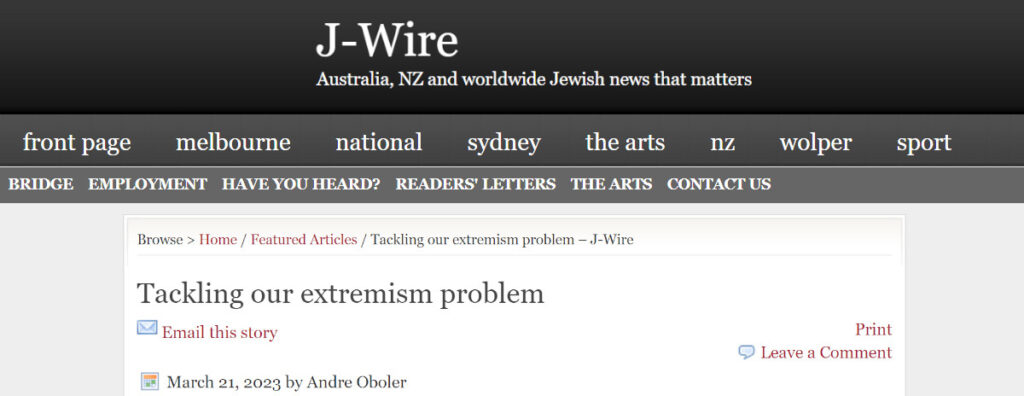
The sight on the steps of the Victorian Parliament on Saturday, black clad neo-Nazis throwing Hitler salutes over and over for half an hour, as Victoria Police stop by protecting them from on lookers, has shocked the Jewish community.
Sometimes it is better to act quietly, to avoid giving the Nazis the attention they crave and use for recruitment. This was not one of those times. The brazen glorification of Nazism on the steps of State Parliament, the heart of Victorian democracy, was not simply a media stunt, it was fascists in our midst boldly throwing down a challenge to society.
Australia needs to unite and meet the challenge. While the Jewish community remains the neo-Nazis’ primary target, we are not their only target. Saturday’s rally was not about the Jewish community at all. It was part of a speaking tour by British anti-transgender rights activist Kellie-Jay Keen-Minshull. Controversy and expressions of extremism are not new to this tour.
At another event in January, part of the same global speaking tour, a speaker cited Mein Kampf, quoted Hitler, and declaring that calling transwomen women was a form of the big lie Hitler warned about. Hitler’s “warning” was a claim the big lie was a Jewish tactic used against Germany, and he and the Nazis used this to vilify Jews and start the process of dehumanisation that led to the Holocaust. According to Sussex Police in the UK, Kellie-Jay Keen-Minshull herself was alleged to have committed an offence by using “use of words or behaviour to stir up hatred on the grounds of sexual orientation” at a rally in the UK as part of this tour in November. She was asked to voluntarily attend an interview with police but told a reported she had refused.
Australia has long been a stop on the speaking tour of those promoting extreme ideologies. There is a video still on YouTube of Holocaust denier David Irving ranting after he was denied a visa for Australia in the early 1990s on character grounds. We should have done the same with Kellie-Jay Keen-Minshull. We don’t need to create spaces for extremism, hate and dehumanisation here. We don’t need to give our local Nazis causes to literally rally around.
We also need to move beyond banning specific symbols and pass general laws banning the glorification of Nazism and the public display of symbols (in general) related to Nazism and neo-Nazism in contexts that promote those ideologies. Germany, for example, bans the use of flags, insignia, uniforms, slogans and forms of greeting (such as salutes) related to political parties and organisations, or substitutes for them, that have been banned for running counter to the German constitutional and which have exhausted any right of appeal to the courts against their ban.
Terrorism charged have been made against people in Victoria, NSW and South Australia associated with the neo-Nazi group we saw on the steps of parliament, but the bar for such charges remains high. Given the wide scope of powers police have in count-terrorism work, and the penalties involved, we don’t want to weaken those protections.
The Nazi symbols ban in Victoria is clearly not enough, but we can’t play wack-a-mole adding new descriptions to the legislation as the Nazis stay one step ahead of the law. We need a more general law with discretion given to police and the courts to apply the law in a sensible manner and properly recognise when symbolism is being used further an extremist cause.
We need to recognise we are not alone. These are international problems. We are part of an international community. As a member of the International Holocaust Remembrance Alliance, Australia has access to consult both governments and leading experts from around the world. We need to engage more and leverage our membership in this and other organisations.
We also need to learn from excellent work being done in deradicalisation in other countries. In November our IHRA delegation heard from Prof. Christer Mattsson, one of Sweden’s leading deradicalisation experts. I met with him for lunch, discussed our local situation, and secured his support for the Online Hate Prevention Institute’s work absorbing Exit Australia, the group that has led deradicalisation efforts in Australia since 2015.
Governments, both state and federal, are banging on the door for support, but funding is currently absent. In other countries it is a very different picture with police, local government, schools, and civil society having formal structures of collaboration and support to counter the threat of radicalisation and pull people back from the brink. It’s a far more cost-effective approach as the longer a person is radicalised, and the deeper they go, the more deradicalisation costs.
Over the last eight years Exit Australia has supported over 250 individuals in leaving extremism. This work is not currently receiving government support and as a result people are falling through the crack. There is also a real risk of re-radicalisation when a lack of resources causes support to fall away. The Online Hate Prevention Institute is proud to have absorbed Exit and to help continue their vital work, but governments, both state and federal, really needs to move beyond symbolism and education and enter into partnerships that provide certainty to support this critical work.
Dr Andre Oboler is CEO of the Online Hate Prevention Institute.
This article first appeared as: Andre Oboler, “Tackling our extremism problem“, J-Wire, 21 March 2023
